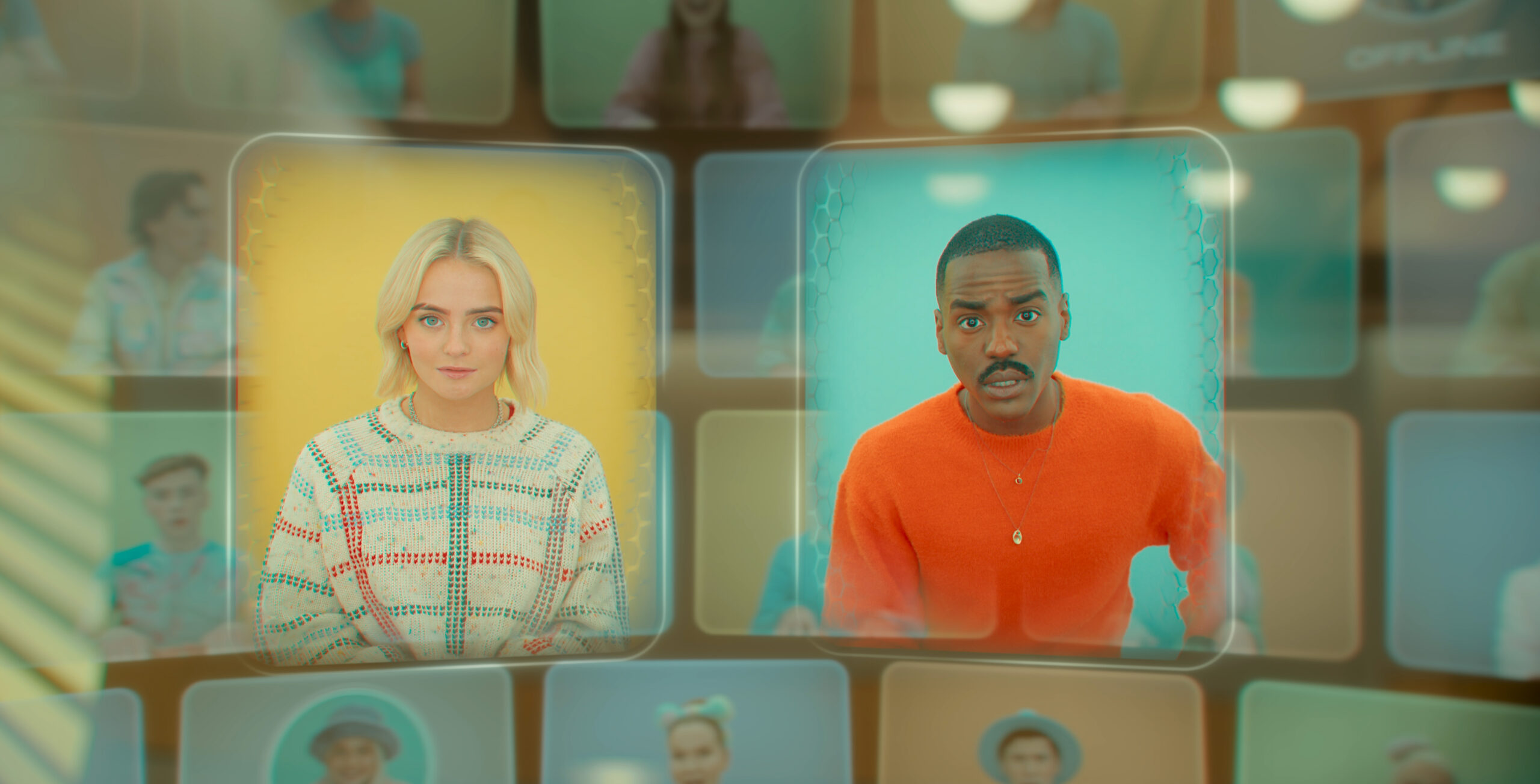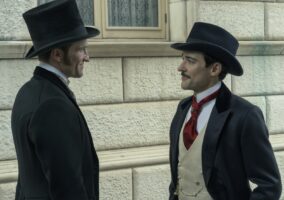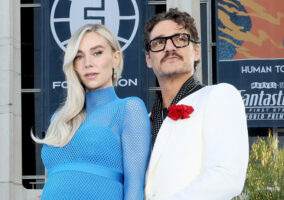
Okay, that’s two weeks in a row, Russell T Davies. Two back-to-back episodes that had us thinking the show was flopping only to see it unveil an episode destined to be seen as a classic. In the first few minutes of “Dot and Bubble,” written by Davies who is also the EP, we alternated between rolling our eyes at what was bound to become an extremely dated episode within a few years and finding ourselves disappointed by the lack of originality in the concept and execution. Put more specifically: we were bored by what looked like a takedown of Gen Z vapidity and consumerism and disappointed by what looked like a rote Black Mirror-esque rebuke of social media. It just didn’t feel original, fresh or able to say anything new on these much-discussed topics and we were annoyed that we were getting another episode in which the lead character only guest-starred. But this wasn’t some topical takedown of social media and influencers by a Boomer. It wasn’t a commentary on a specific generation. And it sure as hell wasn’t sidelining the perspective of the Doctor. It was working very hard to get you to believe it was, however, and that was the genius of it.
It’s not like Davies didn’t warn us at the start of the season that there’s always a twist at the end. Surprise! All of the vapid white rich kids are racist as hell! A tip of the hat to him for turning the most obvious-in-retrospect twist into something genuinely shocking ( to a pointedly specific segment of the audience, to be fair) in a Doctor Who episode. We’ve been noting all season that Davies is somewhat gleefully tackling as many hot-button social and political topics as he can, which means we really shouldn’t have been as surprised as we were, but that is a testament to the writing, directing and acting of the episode as well as a subtle rebuke to anyone (like us) who didn’t get it right away. We won’t spoil the moment, but for those who have seen the second season of Fleabag, it reminded us of that final shot; a moment of pure and direct communication between the creator of the story and you, utilizing the elements of televisual storytelling to get the message across. In Fleabag, the point of that moment was to break your heart, but in this case, Russell T Davies was looking only at specific members of the audience and asking them, “What took you so long to get this?”

If someone had told us ahead of time that there would be a Very Special Episode in which the Doctor discovers micro-aggressions, we’re not sure we’d have been totally receptive to the idea, simply because there are so very many ways a story like this can go wrong when you’re using an alien with a magic box to tell it. That was why the rug-pull was so necessary and executed so meticulously. And look, stories like this one will inevitably draw responses from the people it’s trying to reach that range from smug (knew it all along) to defensive (it’s about class not race), which is entirely the point. If you feel that question wasn’t directed at you or you have some issue with what it’s implying, these too are appropriate reactions. Because the point of a story like this one is to get you to talk about what it’s implying and if everyone sits around congratulating themselves for getting it or rejecting it outright or even yelling at people for taking so long to get it, then it hasn’t really done what it set out to do.
Davies has been clear that he has every intent of pissing off the types of people angry that a gay Black man is portraying the Doctor and while we have no doubt that impulse drove at least some of the motivations behind this story, we think it was much more about taking advantage of the fact that a portion of the audience will always identify with the Doctor, regardless of their race and gender – or even because these things have now become fluid – and expose them to what it feels like to be subjected to a string of microaggressions so subtle that they won’t pick up on it until the mask is full ripped off. All credit must be given to the actors as well; foremost to Ncuti Gatwa, who took on a nearly impossible task for any actor: playing a Black man who has only been Black for a short period of time and whose Blackness he knows to be a temporary part of his identity personally encountering anti-Black racism for the first time; someone who is so far removed from the idea (and its consequences), that he can only react with frustration and surprise.
But Callie Cooke also deserves a round of applause for imbuing Lindy Pepper-Bean with just enough ambiguity to make her unlikable but worthy of the audience’s time — and then subtly disproving whatever faith we had in her. On paper, she had everything you’d expect from a Doctor’s companion: sassy, cute, British, with a twee-as-fuck name. Again, we think all of this was extremely deliberate use of the franchise’s tropes to get you to think you were watching a typical story. Notice how she wasn’t sure if the Doctor was the same man she’d blocked and how appalled she was when she found out Ruby and he were in the same room. She called him condescending and reprimanded him for talking to her like a child; just really well done subtle hints throughout that we, as white viewers, didn’t pick up on until it all became incredibly obvious. We think it’s also a subtle underscoring of the Doctor’s uniqueness in this identity because he didn’t pick up on this until it became incredibly obvious either. He spent the entire episode trying to figure out what the dead kids had in common and even he didn’t pick up on the fact that they were all white.

In the end, there’s no resolution. How can there be? We don’t even get the satisfaction of seeing that rancid bitch eaten by a giant anti-racist slug. The Doctor never even finds out that she killed Ricky. He’s powerless in the face of narrow-mindedness and stupidity and it renders him incoherent in his rage. Those final five minutes were flawless.
And now, random observations:
It was nice to get an episode without so much as a hint of magic, but we still question the decision to have two episodes in a row in which the focus is off the lead character entirely and the ending is ambivalent. We realize shooting schedules were tough, but it might have been better to space these out on the viewing schedule.
On that note, the final scene was Ncuti Gatwa’s FIRST scene as the Doctor, if you can believe it.
Ricky September referred to the Great Abrogation, which sounds way more ominous on a rewatch.
While the show hasn’t been quite as Disney Dollar-infused as we assumed it would be at the start of the season, it’s worth noting that the production design and effects were pretty gorgeous throughout this episode.
Susan Twist returns! And it’s becoming noticeable how the Doctor and Ruby keep circling around her reappearances and then dropping the subject. Almost like there was some sort of perception filter or something…
It’s pretty funny that the AI was so repulsed by these vapid racists that it created the most horrifying possible way to kill them all off.
Free advice to any Comic Con merch-sellers: Someone needs to make a line of ‘I’M WITH THE ANTI-RACIST SPACE SLUGS’ t-shirts.
HACKS, Cancel Culture and the Summer Box Office Next Post:
RUPAUL’S DRAG RACE ALL STARS: Hot Firefighter Makeovers
Please review our Community Guidelines before posting a comment. Thank you!



